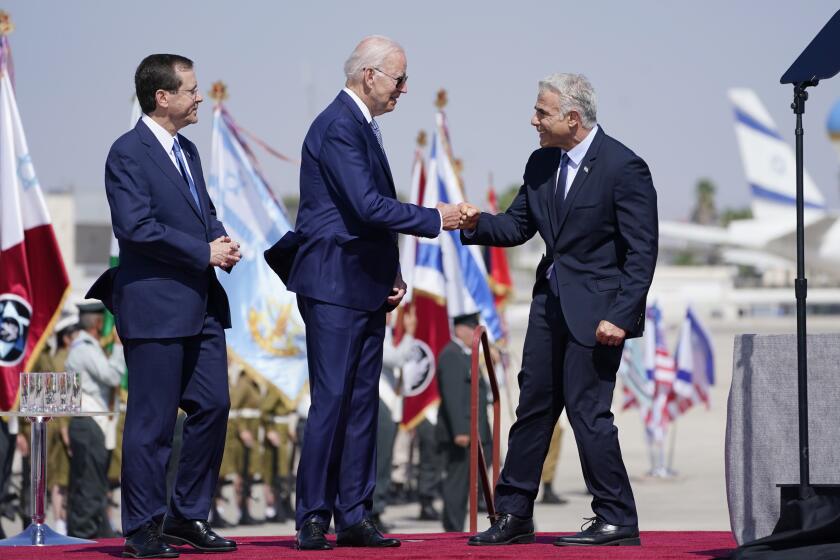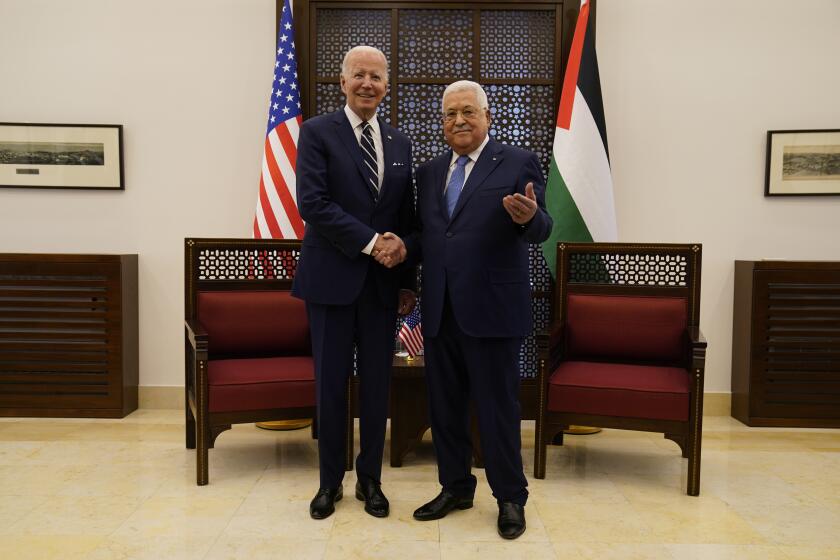Biden says he confronted Saudi crown prince over Khashoggi’s killing

President Biden met with the Saudi royal family in Jeddah on Friday. He said he confronted Saudi Crown Prince Mohammed bin Salman over the slaying of journalist Jamal Khashoggi, for which U.S. intelligence says the prince is responsible.
- Share via
JIDDA, Saudi Arabia — President Biden shared a fist bump Friday with the leader of the oil-rich country he once vowed to make a “pariah” over its human rights abuses as the White House scrambles to mitigate record inflation and high gas prices hammering Americans in an election year.
Biden, facing a barrage of criticism over meeting with Crown Prince Mohammed bin Salman, told reporters that he confronted Saudi Arabia’s de facto leader over the brutal 2018 slaying of Jamal Khashoggi, a U.S.-based journalist and critic of the Saudi government. U.S. intelligence officials have concluded that Mohammed ordered the killing.
“I made my view crystal clear,” Biden said, describing his first meeting as president with Mohammed. “I said very straightforwardly: ‘For an American president to be silent on an issue of human rights is [inconsistent] with who we are and who I am.’”
Biden said Mohammed denied responsibility for the killing and asserted that he had punished those who carried it out.
After weeks of hedging about his reasons for coming to the Red Sea port city of Jidda, Biden told reporters that oil prices had been part of his rationale for meeting with the Saudis. But he said Americans should not expect the meetings to boost global oil supply for several weeks. He argued, as he has for days, that there were broader reasons for his visit that included addressing the threat posed by Iran.
President Biden met with the Saudi royal family in Jidda on Friday, after having said he would marginalize the oil-rich kingdom. He said he confronted Saudi Crown Prince Mohammed bin Salman over the slaying of journalist Jamal Khashoggi.
Biden’s approach to his meeting with Mohammed has been a striking contrast with how his predecessor, former President Trump, handled the U.S. relationship with the Saudis. Trump made a show of his good relationship with the Saudi royals, arguing that arms sales to the country justified not pressing the kingdom over human rights matters. Trump chose Saudi Arabia as his first foreign travel destination, accepting a thick gold medal from the king, swaying along to a sword dance and touching a giant glowing orb as part of a lavish extravaganza that became emblematic of his fealty to the kingdom.
“We’re focused on the meetings, not the greetings,” said a senior Biden administration official who briefed reporters traveling with the president on condition of anonymity.
But the attempts to avoid photographs of a handshake between Mohammed and Biden have only brought more attention to the atmospherics of a meeting that was destined to be awkward since it was announced last month.
The media pool traveling with Biden was not given access to his entry into the palace, leaving it to the Saudi government — eager to play up the visit — to release photos showing the men fist-bump and walking to the meeting site together. (White House officials had suggested earlier in the week that in the face of a surge of the coronavirus, Biden was exercising caution in avoiding a handshake with the crown prince. But then he had shaken hands with officials in Israel and upon landing Friday in Saudi Arabia.)
“The fist bump between President Biden and Mohammed bin Salman was worse than a handshake — it was shameful,” Fred Ryan, publisher of the Washington Post, which published Khashoggi’s opinion pieces, said in a statement. “It projected a level of intimacy and comfort that delivers to MBS the unwarranted redemption he has been desperately seeking.”
Hatice Cengiz, Khashoggi’s fiancee, tweeted to Biden that “the blood of MBS’s next victims is on your hands.”
Biden, asked about the comments, said he was sorry she felt that way.
“I just made it clear, if anything occurs like that again, they’ll get that response and much more,” Biden said.
Biden’s visit is seen as a win for Saudi Arabia and Mohammed, whom Biden sharply criticized during his 2020 campaign over the killing of Khashoggi, a Saudi citizen who worked as a journalist in the U.S. Khashoggi was slain in the Saudi Consulate in Istanbul.
Faced with the bleak reality of rising gas prices — Saudi Arabia is a major global oil producer — Biden has toned down that criticism over the slaying since taking office. In an op-ed published last week, Biden did not list U.S. energy needs as a reason for his visit to the oil-rich kingdom. He cited the importance of normalizing ties between Arab nations and Israel, ending the war in Yemen, dealing with Iran, addressing climate change and developing counterterrorism strategies.
President Biden, who vowed to ‘shoot straight’ with the public, has sought to avoid some difficult subjects about his visit to Saudi Arabia.
It is not just Khashoggi’s killing that has caused consternation. Human rights organizations have a long list of concerns about how Saudi Arabia treats women, political dissent and its neighbors. Saudi rules, for example, bar women from significant aspects of society, and the Saudi government has been sharply criticized for bombings that targeted civilians in Yemen.
Martin Indyk, a former special U.S. envoy to the Middle East and ambassador to Israel who was in the Saudi capital, Riyadh, last week, said there was a “sense of arrogance” among Saudi officials he met with because “now the president’s going to have to eat crow and kiss the ring,” validating the kingdom’s strategic importance.
American strategic interests here go beyond oil, requiring Biden to temper his desire to marginalize the kingdom, even if this visit is not likely to produce many tangible results, he said.
“Both sides should understand that they need to find a way to work with each other and set the direction in the future for a better relationship,” he said.
Biden has been eager to use the trip to build on growing alliances with Israel and its former Arab adversaries. Those closer ties have been spurred by mutual fear of Iran, which appears to be on the verge of developing a nuclear weapon.
Saudi Arabia, like Israel, is expected to urge Biden to abandon his hope of redrawing a 2015 nuclear arms control accord with Iran that Trump abandoned. Biden argued in Israel that diplomacy was the only way to halt Iran’s nuclear development, even as Israelis contended that the negotiations would only buy Iran more time.
Before Biden left Jerusalem for Jidda on Friday, he announced that Saudi Arabia had agreed to open its civilian airspace to Israel for the first time, a step toward what he hopes will be formal relations between the two countries. Such a move would follow a recent wave of Arab countries that have given formal recognition to Israel, beginning in 2020 with the United Arab Emirates.
White House officials on Air Force One noted that the president was making history in traveling to Jidda from Tel Aviv, though Saudi’s new rules stop short of allowing direct commercial flights from Israel to land on its soil.
“This is the first public step that Saudi Arabia has taken, vis-a-vis Israel,” said Jake Sullivan, Biden’s national security advisor. “And in that regard, it is historic.”
Biden will hold additional talks here Saturday with leaders from Egypt, Jordan, Iraq and six Persian Gulf nations. Sullivan said he does not expect any action on increasing oil production to come during the meetings but is hoping the broader group of oil-producing nations known as OPEC+ will make announcements in coming weeks.
The president acknowledges in a brief trip to Bethlehem the despair of Palestinians long frustrated in their fight for equal rights.
“This is a trip of trade-offs,” said Marti Flacks, a former National Security Council and State Department official who now heads the human rights program at the Center for Strategic and International Studies, “and I think that we have to be clear and transparent about the calculations that the U.S. administration is making.”
Though the trip has stirred controversy, it is not expected to yield many concrete achievements. It has been more about sending signals and defining Biden’s Middle East policy, according to analysts.
Before Biden arrived in Jidda, he capped off his three days in Israel with a trip to the West Bank and East Jerusalem, where he visited a church, a hospital and held a meeting with Palestinian Authority President Mahmoud Abbas.
Biden pledged more than $316 million in new aid and reiterated support for a Palestinian state but cast doubt on a near-term peace process.
“Even if the ground is not ripe at this moment to restart negotiations, the United States and my administration will not give up on trying to bring the Palestinians and the Israelis, both sides, closer together,” he said.
The aid and the pro-statehood statements provided a contrast to Trump, who cut assistance to Palestinians and moved the U.S. Embassy in Israel from Tel Aviv to Jerusalem. That move was considered a provocation because the city has significance to both Palestinians and Israelis. Palestinians say East Jerusalem would be the capital of any Palestinian state.
Palestinians, who were optimistic that Biden would be a better partner than Trump, have grown increasingly vexed with the U.S. government’s approach to the region.
Bierman reported from Jidda and Wilkinson from Washington.
More to Read
Get the L.A. Times Politics newsletter
Deeply reported insights into legislation, politics and policy from Sacramento, Washington and beyond. In your inbox twice per week.
You may occasionally receive promotional content from the Los Angeles Times.














